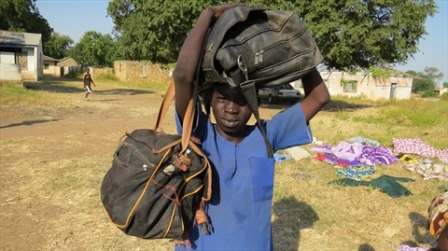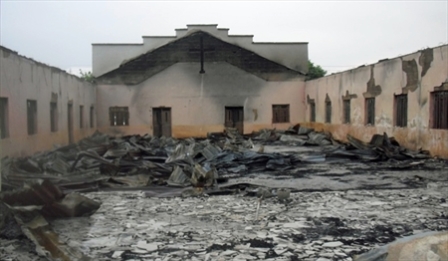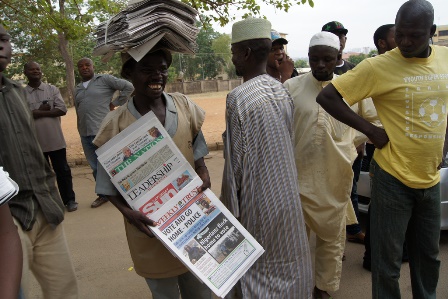
Ahead of Nigeria’s general elections on 28 March, hundreds of people, fearful of election violence, have fled back to their place of origin, World Watch Monitor has been told.
The election was originally scheduled for 14 February, before being postponed to the March date for security reasons.
Take for example Sam Nwodo, 48, a dealer in motor parts, who has moved his family from Gusau, the capital of Zamfara State in northern Nigeria, to his native Imo State in the south. In 2000, Zamfara State was the first to implement Sharia (Islamic law) in the country. This act was then followed by 11 other states in the north.
The election between the two main candidates: incumbent President Goodluck Jonathan, of the ruling People’s Democratic Party (PDP) and the opposition (All Progressives Congress, APC) one, Retired Gen. Muhammed Buhari, has crystallised tensions and divisions along religious and ethnic lines.
In 2011, the victory of Jonathan, a Christian from the southern Niger Delta, provoked an eruption of violence in Katsina, the hometown of Gen. Buhari in the north. The post-election violence, which Human Rights Watch described at the time as one of the bloodiest episodes in Nigerian history, spread quickly to all 12 northern states and claimed more than 800 lives. More than 350 churches were burnt down, among other properties.
The conflict has left lasting scars on many Nigerians who would not want to be caught in another wave of violence. Sam Nwodo, for instance, is sceptical and has been willing to forfeit his vote for his safety.
“We are afraid because we feel that this election may lead to the disintegration of Nigeria. There may be war because of the desperate nature of politicians. The candidacy of President Jonathan and Gen. Buhari has polarised the Nigerian masses along religious lines.
”Many Igbos (from the majority Christian south) in Gusau are leaving en masse because we don’t know what will happen. No matter how brave you are, when you see your people leaving in such large numbers you have no choice but to move too”.

The fear of violence has also gripped Nigeria’s central states, known as the Middle Belt, the natural border between north and south. From Kaduna, capital of Kaduna State, some 400 ethnic Igbos are known to have relocated to their hometowns in the south-east of Nigeria. Others have chosen to stay but have relocated their families, according to a source at the Igbo Welfare Community.
Innocent Anya, 48, relocated his family back to his hometown in the southern Enugu State, even prior to postponement of the election. The father of four has lived in Kaduna, where he earned his living repairing air conditioning units, for the past 22 years. He told World Watch Monitor that there were glaring signs of violence even before the Independent National Electoral Commission (INEC) postponed the election.
”Each time there are problems in the north, we Igbos are always the target of attack by northern Muslims as if we are the cause of the problems.”
”I was almost killed during the 2011 election violence. Many of our people were killed and our properties were either looted or destroyed. So we don’t want to be caught in another wave of violence again.”
Donatus Ezenakwe, a stationery dealer in Kaduna, recalled that ”in 2011, they took us unawares, and many of us were killed. So I can’t stay back and witness another killing,” he said.
“The campaigns have been violent. The Muslims in the north are insisting that General Buhari must win the election this time around. President Jonathan’s supporters, especially the Niger Delta militants, are threatening that there would be war if Jonathan does not win the election. So the scenario is frightening.
“I had no choice than to relocate to my village in (the southern) Anambra State, where we will be safe from the mindless killings,” he added.

A similar trend has been observed in various southern states, where hundreds of mainly Hausas have fled back to the north.
Alhaji Abdullahi Aliyu, a 51 year old Muslim, lived and worked in Bayelsa, Nigeria’s most southerly state, for about 20 years. He has now moved his wife and six children to the northern town of Funtua, in Katsina State.
“We are afraid because the moment they start attacking people in the north, the southerners will want to retaliate by attacking northerners who are living in their communities and we will have to run to the military and police barracks,” he said.
The 2015 election campaigns have been marred by violence. According to Nigeria’s Human Rights Commission, no fewer than 58 people lost their lives between December 2014 and January 2015.
In Kaduna, Christians and Muslim clerics have been working together to prevent a new eruption of violence.
Leaders of the Kaduna State chapters of the Christian Association of Nigeria (CAN) and the Jama’atu Nasril Islam (JNI) have helped launch the One Family Under God campaign to combat identity-based conflict.
The campaign has resolved to ensure that anybody engaging in violence or harbouring anyone with violent intent during the elections would be handed over to security agents.
Meanwhile, about 1.5 million people displaced by the Boko Haram insurgency in the north may not be able to cast their vote, although the government says it has plans for polling stations in IDP camps and so on.
Nigeria’s 173 million people are split almost evenly between Christians in the oil-wealthy and westernised south and Muslims in the underdeveloped north.